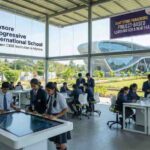The National Education Policy (NEP) 2020 is steering a pivotal transformation in India’s educational landscape, emphasizing skill development and comprehensive learning over traditional metrics like school size and physical infrastructure. This shift aligns with global educational trends that focus on producing adaptable, skilled, and well-rounded individuals capable of thriving in a rapidly evolving world. Let’s delve into how the NEP is redefining educational success by prioritizing skills over space.
Shift from Physical Infrastructure to Skill Development
Historically, the size of a school’s campus and its facilities were often seen as indicators of its quality and the effectiveness of its educational programs. The NEP 2020 disrupts this paradigm by asserting that a school’s value comes not from its expansive playgrounds or towering buildings but from the skills it imparts to its students.
Key Areas of NEP’s Focus:
- Critical Thinking and Creativity: Encouraging schools to move beyond rote learning, the NEP emphasizes fostering critical thinking skills, creativity, and the ability to solve complex problems through innovative educational practices.
- Holistic Development: The policy stresses the importance of nurturing students in all dimensions—intellectual, physical, emotional, and social—through curricula that integrate arts, sports, and academic subjects seamlessly.
- Teacher Training: Recognizing that skilled educators are crucial for effective teaching, the NEP advocates for rigorous teacher training programs focused on modern pedagogical methods that emphasize interactive and student-centered learning.
- Technology Integration: With an understanding that technological proficiency is crucial in the 21st century, the NEP promotes the integration of digital tools in education, ensuring that students develop necessary technological skills regardless of their school’s physical size.
Redefining Classroom Spaces
With a focus on making the best use of available resources, the NEP encourages schools to optimize smaller spaces creatively. Here’s how:
- Flexible Learning Environments: Schools are encouraged to create versatile learning spaces that can serve multiple educational purposes, from technology labs that double as lecture spaces to libraries that can host interactive learning sessions.
- Community Partnerships: The policy suggests schools collaborate with local community centers, libraries, and other facilities to extend learning spaces beyond the school premises, thereby enhancing experiential learning opportunities without the need for large campuses.
Enhanced Assessment Models
Moving away from traditional examination models, the NEP proposes more formative and competency-based assessments to evaluate students on a broad range of skills:
- 360-Degree Assessments: These holistic assessments provide feedback on a student’s academic performance, skills, attitudes, and values, offering a comprehensive picture of their strengths and areas for growth.
- Continuous and Comprehensive Evaluation: Regular evaluations are designed to gauge understanding and skills application continuously, promoting a deeper, more consistent learning process.
Global Alignment
The NEP’s emphasis on skills over space is in line with global educational standards that prioritize functional knowledge and adaptability:
- Skills for a Global Economy: The policy prepares students for global challenges and opportunities, equipping them with skills that are valued internationally, such as multilingualism, technological literacy, and global citizenship.
- Sustainable Education Practices: By promoting efficient use of resources and digital education, the NEP contributes to more sustainable educational practices globally, reducing the ecological footprint of schools.
Conclusion
The NEP’s strategic shift from emphasizing large physical spaces to fostering a skills-based educational environment represents a modern approach to schooling. It ensures that Indian education is not only competitive on a global scale but also accessible and sustainable, preparing students for the demands and challenges of the future. Through this transformative policy, schools across India are poised to unlock the full potential of their students, focusing on skills development over the size of their campuses.




























